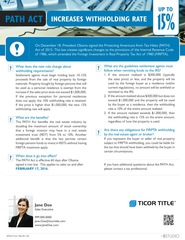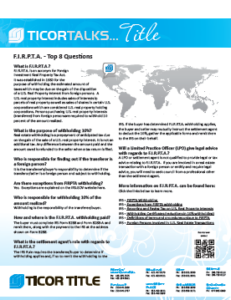 On December 18, President Obama signed the Protecting Americans from Tax Hikes (PATH) Act of 2015. This law creates significant changes to the provisions of the Internal Revenue Code of 1986, which amended the Foreign Investment in Real Property Tax Act of 1980 (FIRPTA).
On December 18, President Obama signed the Protecting Americans from Tax Hikes (PATH) Act of 2015. This law creates significant changes to the provisions of the Internal Revenue Code of 1986, which amended the Foreign Investment in Real Property Tax Act of 1980 (FIRPTA).
What does the new rule change about withholding requirements?
Settlement agents must begin holding back 10-15% proceeds from the sale of real property by foreign nationals. Property bought by foreign persons that will be used as a personal residence is exempt from the increase if the sales price does not exceed $1,000,000. If the previous exception for personal residences does not apply, the 10% withholding rate is retained. If the price is higher than $1,000,000, the new 15% withholding rate will apply.
What are the benefits?
The PATH Act benefits the real estate industry by doubling the maximum amount of stock ownership that a foreign investor may have in a real estate investment trust (REIT) from 5% to 10%. Another additional benefit is that the law permits certain foreign pension funds to invest in REITs without having FIRPTA treatment apply.
When does it go into effect?
The PATH Act is effective 60 days after Obama signed it into law. This applies to sales on and after FEBRUARY 17, 2016.
What are the guidelines settlement agents must follow when remitting funds to the IRS?
- If the amount realized is $300,000 (typically the sales price) or less, and the property will be used by the foreign buyer as a residence (within current regulations), no amount will be withheld or remitted to the IRS.
- If the amount realized above $300,000 but does not exceed $1,000,000 and the property will be used by the buyer as a residence, then the withholding rate is 10% of the entire amount realized.
- If the amount realized exceeds $1,000,000, then the withholding rate is 15% on the entire amount, regardless of how the property is used.
Are there any obligations for FIRPTA withholding by the real estate agent or broker?
If you represent the buyer or seller of real property subject to FIRPTA withholding, you could be liable for the tax that should have been withheld by the buyer in certain circumstances.
If you have additional questions about the PATH Act, please contact a tax professional.


